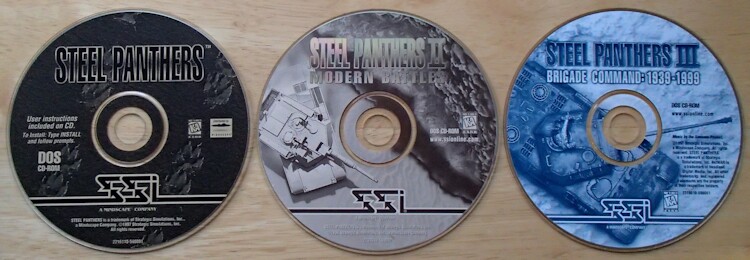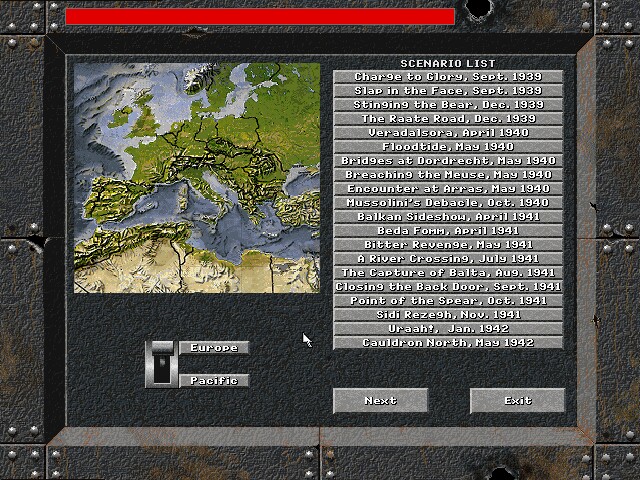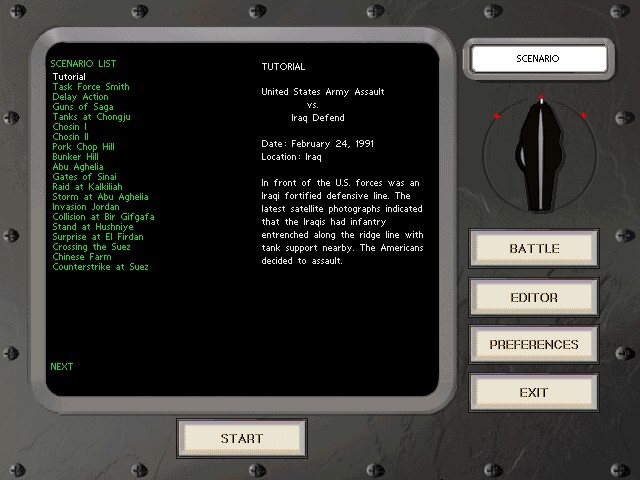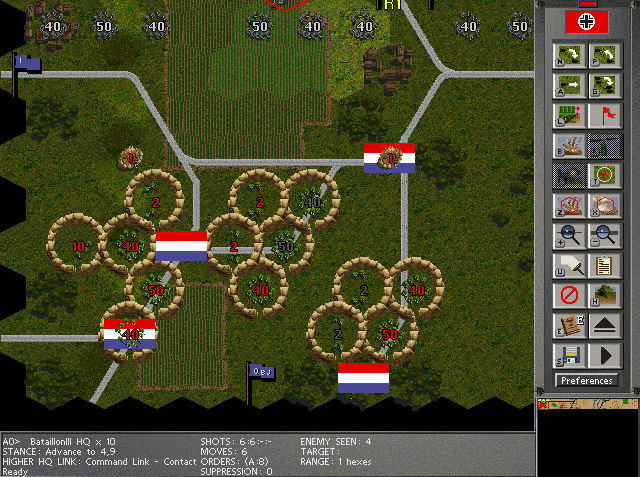
Actual Game
Steel Panthers Trilogy Steel Panthers I 1-Click Install
|
The Games
Steel Panthers
Steel Panthers is, even today, a rock solid WWII squad level tactical simulation. At this level, squads consist of approximately 10 men and vehicles are represented individually. The map scale used is 1 hex = 50 yards which is roughly equivalent to the board games Squad Leader and Advanced Squad Leader.
The similarities don't stop here. Steel Panthers uses a turn based board game paradigm for play. Each player takes turns maneuvering and firing their units while the computer takes care of housekeeping. By taking this approach, SSI removed enough complexity so that the average player will enjoy the game. However, they left in enough detail to attract the avid board gamer.
For a mid 1990s game the graphics are simply incredible. They are displayed in 640x480 with 256 colors. The maps used are as varied as the actual terrain in WWII. Each is a work of art and very pleasing to the eye. This includes maps for Desert, Jungle, Urban, Rural, and Snow encounters. SSI even went so far as to include the mission builder used to create the large number of scenarios included with the game.
With the mission builder you can build and save individual maps that can be used by other Steel Panthers owners. You can then use these custom maps to create custom scenarios which you can freely distribute. The implication here is that the range of scenarios available for Steel Panthers is limitless. You can literally recreate any land battle fought during WWII.
In addition to individual scenarios you can also engage in a campaign. When playing campaigns, you are given a certain number of points to buy your core units (these units will acquire experience and the surviving ones will be available in the successive campaign scenarios).
After purchasing your core units, you are given so many points to buy extra units that are available for that campaign scenario only. Once the battle is complete these units will go away. These units include the standard fighting units and off-board artillery / air units, if available.
SSI did a great job of developing Steel Panthers. It is a wonderfully detailed beautiful representation of WWII squad level combat. In fact, for this level of tactical game, there were no contenders during the era. Battle at Ardennes is probably the closest and is played at a different scale than Steel Panthers. Even so, the two do not compare. Steel Panthers is pure gold.
Steel Panthers II
"It wasn't fair," an Iraqi general is supposed to have said to his American captors during the Gulf War. "We didn't know you were attacking until all our tanks had blown up."
If you're like most people you watched the Allied forces roll up the Iraqi army with something akin to awe. The bloody attrition of World Wars I and II and the stalemates of Korea and Vietnam culminated in the Gulf War's efficient, lethally precise modern warfare, and Steel Panthers II: Modern Battles captures it perfectly. Encompassing the epic sweep of post-World War II combat, from 1950 to 1999, it puts you on the battlefields that have defined this half-century of combat.
Steel Panthers II follows up the successful Steel Panthers, which dealt exclusively with combat in World War II. Created from a core design by wargame vets Gay Grigsby and Keith Brors, with an engine and graphics from SSI's special project team, SP1 had the perfect balance of playability and depth, with a large database, a wide variety of scenarios and campaigns, and the ability to create your own custom maps and scenarios. SP2 offers a similar engine with several new features, but more important is the massive new database of 1,000 modern units. Infantry, armor, artillery, and air assets are all modeled in depth, and units have characteristics unique to each time period used in the game.
Let's take a look at the engine and its refinements first. SP2 is a tactical, turn-based wargame, so it deals with small unit formations such as squads, platoons, and companies. The map is a traditional hex-grid design (you can turn a hex overlay on or off) with terrain features ranging from hills and rivers to bridges and buildings. Move your units across the map and, when an enemy unit is in range, click on the crosshairs to attack. Artillery is primarily "off map" and is controlled through a separate panel where you select the target and type of barrage (smoke, cluster, or high explosive shells). This panel also enables you to order air attacks.
There are several refinements to this system, and all improve gameplay by giving you more control over how you set up an attack. A new "shift barrage" feature allows you to redirect artillery fire within a certain area without waiting a turn. When ordering air attacks (and the use and modeling of air assets is far more extensive than in SP1), you can now set ingress and egress points for each flight. This means you can set up a run by an A-10 along the line of a road to catch as many enemy units in one flight as possible. (Previously, an air unit would just cross the road from any direction and hit a single spot.) Finally, you can call up a unit information screen and set the primary weapon. For example, you can choose to have an engineer use only his flame thrower, or an Apache fire just a rocket salvo rather than a Hellfire missile. All this gives a much larger range of control over battles than SP1 offered, and improves on an already solid game engine.
The new database shows the drastic change in the nature of warfare and the unique qualities of the modern battlefield. Scenarios take on the Korean War, the Arab-Israeli Wars, Vietnam, Afghanistan, the Gulf, and others, with full campaigns for Korea 1950, Golan Heights 1973, Germany 1980 (hypothetical height of the Cold War stuff), Desert Storm 1991, and hypothetical US versus China and US versus Japan.
The missions and campaigns included draw from many of the major conflicts since WWII, and some yet to come. The 51 stand-alone scenarios and six full campaigns will be plenty to keep folks busy while they wait for the first expansion sets and user-made scenarios. An interesting new feature, the random battle and campaign generator, pretty much rolls a new battle on the fly as you set preferences for such things as opposing sides, time period, landscape, and so on. And, as with the first SP, the scenarios editor gives this one an infinite life. You can build maps from scratch, make orders of battle for any of the 40 countries represented, and create custom scenarios of just about anything. It ain't easy, but it's fun.
The weapons brought to bear in these battles highlight the evolution of technology: weapons shoot further and are more lethal, gunship support changes the whole dynamic of the battle, and never screw with an M1A1 Abrams. Little touches will thrill some wargamers. For instance, you can set the height of a chopper from landed, to nap of earth, to high altitude, each with its own uses in different situations. (At high altitude, you even see a little helicopter shadow on the ground.) Watching a tight American armored assault shred an enemy with the one-two punch of Apache and Abrams is about as cool as wargaming gets. Jungle fighting in Vietnam, with Hueys sweeping out of the sky for double envelopments, is a rare experience for computer gamers. Even better are the guided-missile vehicles and teams, which are a real trip to watch. The little map animations are as good as they were in the first SP: buildings cave in, bomb craters form, fields burn.
This is the best modern warfare game of the era, deep enough to satisfy the most dedicated wargamer, and playable enough to please the novice. What more could you want?
Steel Panthers III
With the release of Steel Panthers 1 SSI introduced the best tactical wargaming system then available. Its success was the result of combining the hard-core data modeling of the best SSI games with an intuitive interface, good graphics, and a flexible scenario editor. Last year's Steel Panthers II further refined the system and added modern weapons to the World War II weapons of the original. It was a full leap forward for the system.
Volume III, Brigade Command, makes another full leap in the evolution of the series. The interface and graphics are from SPII, with units from both games. The point of SPIII is to broaden the scope of the system to encompass larger battles than the small-unit scale of the originals could handle. Some new gameplay elements were introduced, giving the game a "Deluxe" version of the hallmark series.
The nature of modern combined-forces warfare places command, control, communications, and intelligence (known as C3I) at the heart of tactical doctrine. C3I links the various weapons platforms and units into a single, well-coordinated force with greater power than the individual units could muster on their own. Creating a cohesive yet flexible plan, having skilled leaders with strong initiative, scouting the enemy, and keeping all units in contact with others are the basics of sound tactics. SP3 models all of these in greater depth than its predecessors, creating a game with nuances and greater realism.
Several new features drive this expanded scope. Maps are larger, and individual units are grouped into larger command structures (platoons, companies, regiments). Leaders are modeled in greater depth, and their use in spotting artillery and rallying troops is even more important than in previous SP titles. Units also have more complex state and order modeling. They must be placed in either offensive or defensive states and given specific hex destinations when advancing. When out of contact, they will follow their last orders, making advance planning more important. With the proper advance orders, large sections of the army can be turned over to computer control.
In short, command is re-created in greater depth, emphasizing good planning and sensible use of combined forces. The 40 battles and six campaigns cover the period from World War II to the near future and present a diverse mix of large-scale actions. Hundreds of units and equipment types from dozens of nations are included, and unit values can be altered to create new ones. All the scenarios are well done, and when coupled with scenario and campaign editors and random battle generators, they present limitless replay value. The sweeping scale of modern warfare, ranging from the invasion of Poland and Operation Market Garden to future battles in Europe and Korea, is admirably captured.
The changes to the system are much welcomed and let the franchise go out on a high note. Grognards will find the refined system a treat.








